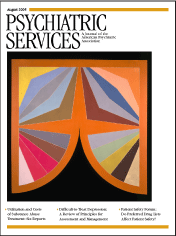Commentary: Physicians Should Not Be Agents of the Police
A threat against the U.S. President is a felony under federal law, punishable by up to ten years in prison. The Secret Service keeps lists of persons who have made threats, many of whom have a mental disorder and may locate and monitor such persons at the time of presidential visits. Since the time of Andrew Jackson, such concern has not been misplaced, because many assassination attempts against Presidents have been made by the mentally ill.
Statutory mandated practice requirements, case law, and medical and psychiatric ethics interact to define practice standards for the psychiatric profession. Sometimes the result is conflicting obligations that require a complex consideration of principles to reach an appropriate standard of practice. Brook Zitek and colleagues, in their Open Forum piece, recommend a practice guideline for patients who threaten the President in the psychiatric emergency service. I believe their recommendation is clinically and ethically inappropriate and may subject psychiatrists to malpractice claims.
Psychiatrists have been given the authority and responsibility to hospitalize persons with mental disorders involuntarily, if they are dangerous to themselves and others, under police and parens patriae powers of the state. Following the Tarasoff case in California in 1976 they also, in most jurisdictions, have the responsibility to take steps to prevent certain types of harm. This duty can be fulfilled by warning a potential victim or the police, or both. In most jurisdictions, if the patient is hospitalized there is no immediate danger, and a warning does not have to be made. In the emergency department the immediate clinical goal is to decide whether the patient has a mental disorder and requires hospitalization, on either a voluntary or an involuntary basis.
In the case reported by Zitek and colleagues, rather than immediately hospitalizing the patient, the staff called the Secret Service. After a "brief interview," the accompanying police officer filed a petition for involuntary commitment; the resident then proceeded to certify the patient to an inpatient unit. I fail to discern any benefit from this course of action. The police had the patient sign a release to review his medical records, thus obtaining a confession for the record. The "patient" was then charged and convicted of the federal crime.
Although the authors state that if the patient is hospitalized there is no need for immediate notification, they continue to justify the notification. First, they state that because they could not determine the "reasonable probability that the patient may carry out the threat," it was a "reasonable precaution" to contact the Secret Service. Given that hospitalization was clearly indicated, I do not understand why the police or the Secret Service needed to be invited to the emergency department and given access to the patient. Second, the authors state that it was not in the patient's interest to "minimize his threatening verbalizations toward the President." Here, the authors announce their own moral judgment—that "an autonomous adult takes full responsibility for his or her actions, and there are consequences to violating the statute." This decision was made before the authors made a comprehensive diagnosis or any assessment of how autonomous the patient actually was. In addition, they made no suggestion to the patient that he might want to consult with an attorney if they felt a mandatory report was necessary, and they were concerned about his best interests.
It may well have been the considered assessment by the inpatient unit, after performing a more complete assessment, that a Tarasoff warning was required on the grounds of the patient's condition at the time of discharge planning. That is the appropriate time for such a disclosure (except in the case of one of the other examples of imminent harm mentioned, such as elopement). Making the disclosure at the time of discharge planning would allow for a more ordered plan about how the patient might want to handle the legal consequences. I am surprised that the resident was not called as a witness to the crime at the trial—although I realize that may have been made unnecessary by the confession or the use of the medical record. This example is a bitter pill for someone who comes in for treatment—to find that the doctors thought they were helping him by encouraging a confession to the police while he was in a psychotic state and without advice of counsel.
I am not objecting to the Tarasoff obligation of reporting in emergency situations where there is no possibility of hospitalization, or in cases of elopement. However, I do object, absent a reporting statute such as exists for child abuse, to making physicians agents of the police, helping to extract confessions from individuals seeking treatment.
Dr. Zonana is professor in the department of psychiatry of Yale University School of Medicine in New Haven, Connecticut, located at the law and psychiatry division of the Connecticut Mental Health Center, 34 Park Street, New Haven, Connecticut 06519 (e-mail, [email protected]).



